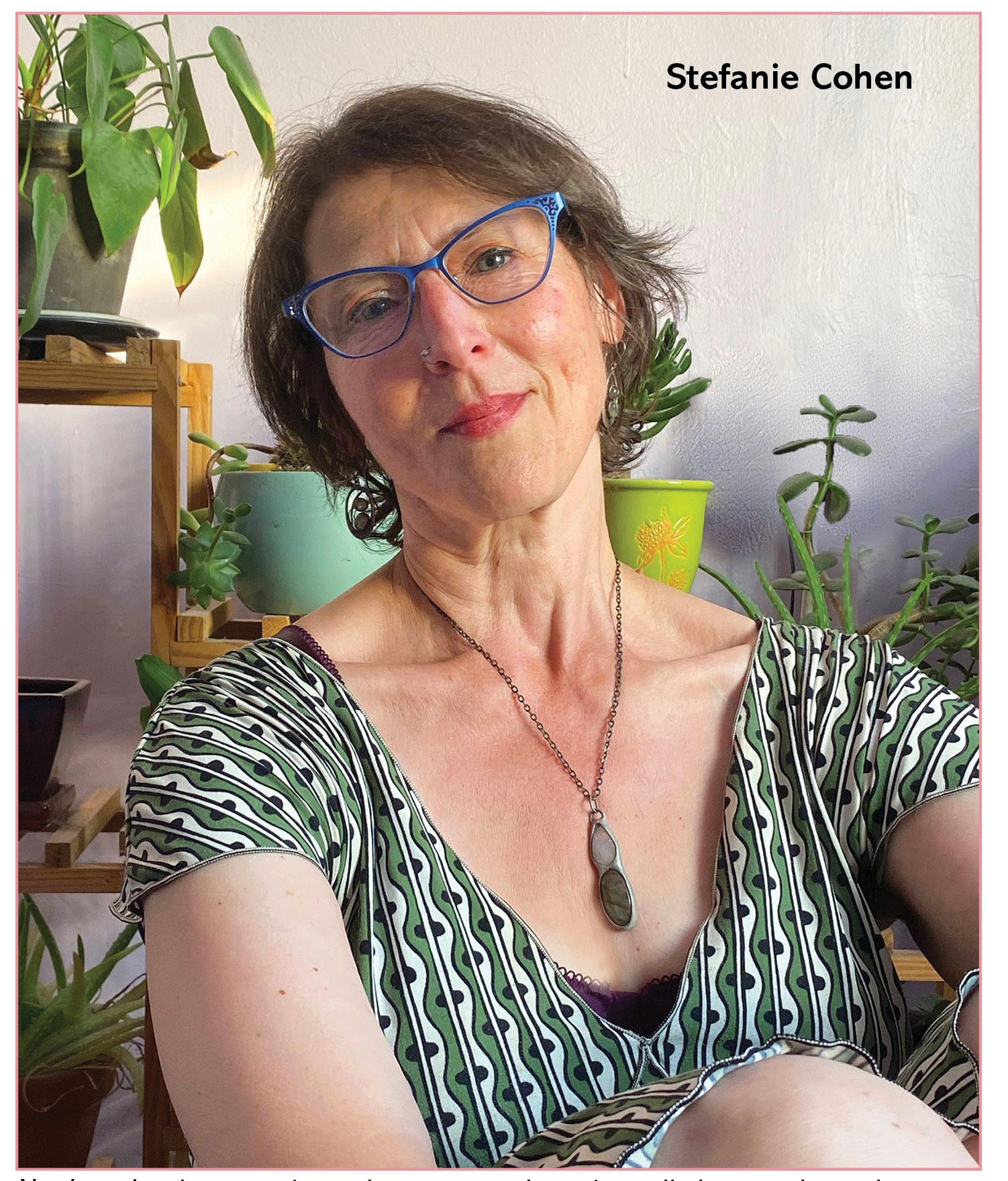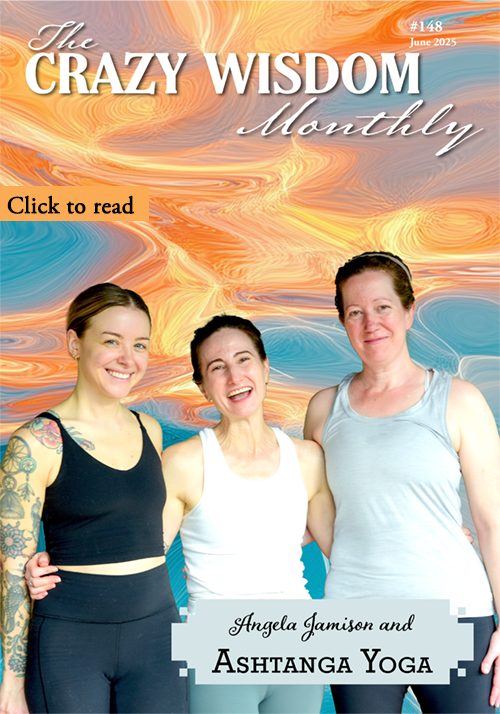Edited By Diane Majeske
Crazy Wisdom Journal asked a number of leaders in southeastern Michigan’s conscious living community to reflect upon times in their lives that they’ve left their comfort zones to venture out in new ways. In the distant past or much more recently, we asked, what did you do, what inspired you, did it change you, inside or outside, big or little? Did you attend a new class, take an adventurous trip, go skydiving, stretch beyond a long entrenched boundary, start a new relationship or end an old one, take a leap, retire, join the Peace Corps, go on a night trek in the wilderness, or just do something way out of your ordinary?
SUSAN WESTHOFF: FINDING A NEW LEVEL OF COMFORT OUTDOORS
Susan Westhoff is the Executive Director of the Leslie Science and Nature Center and the Chief Operating Officer of the Ann Arbor Hands On Museum.
I have left my comfort zone many times. In my career in the non-profit world, I’ve worked in the arts presenting arena, at a world-class symphony, on a long-distance hiking trail, at an Irish dance school, and now a nature center merged with a children’s science museum. Fairly widely diverging subjects, I know, and in different parts of the country.
However, the time I keep coming back to is when I worked at the University Musical Society here in Ann Arbor in education, just out of school with a music performance degree, and spent my free time getting my “sea legs” as a fairly new hiker and camper. I loved the outdoors and was learning to explore and become comfortable as an outdoors person.
I took a risk and signed up with the American Hiking Society to help build trails in the Gila National Forest in New Mexico. I’d never been to New Mexico, never built a trail, and didn’t know anyone on the trip. I definitely had friends and family who didn’t understand and thought I was a little crazy, and others who thought it was fantastic.
The trip was amazing. I was pushed physically beyond my comfort zone, swinging a Pulaski and pick Mattock, working with total strangers with a crosscut saw, and seeing a part of our country that was new to me. We dug and used pit toilets in the ground, made communal dinners, and in a matter of days created community deep in the Gila wilderness.
One day we hiked, and I saw my first herd of elk and heard them bugle. I had no idea the incredible diversity of wildlife, plant life, and terrain that I would see. We climbed up a fire lookout tower and talked about the management of the land, and how we impact that land in both positive and negative ways.
The experience transformed me in direct and indirect ways for certain. I felt more confident taking risks; it led me to move out of Ann Arbor to Chicago to see what it felt like to live in a big city and spread my wings. I felt more confident, after meeting my future husband, to up and move to the mountains of Colorado with him without either of us having jobs and trusting that it would work out. Over and over, I have taken risks, big and small, and knew I was strong enough to handle it if it didn’t work out –which it hasn’t, always.
This experience also solidified my love for the outdoors. When I first met my husband, we went camping over Thanksgiving in the Ozarks after knowing each other for only two months. We quickly took to backpacking together, and now that we have children, we enjoy taking them camping and exploring. This love for the outdoors connected me to an amazing group of people in Colorado as we worked to build the Continental Divide Trail (a passionate group still working on this goal, to complete the trail: continentaldividetrail.org), and brought me to the amazing place I work today, the Leslie Science & Nature Center.
I honestly don’t know if I would have made my way to LSNC, if I hadn’t made this life-long journey. It started when I was little and visited Ricketts Glen State Park with my grandmother and family, built as I started camping and hiking, and then became a critical part of me as I stepped out of my comfort zone and onto the trail with a Pulaski in hand.
Read related article: Out of My Comfort Zone with Harry D. Chen and Ellen Sapper
DAVID HALL: PERSONAL REFLECTIONS ON COMFORT ZONES
David M. Hall has followed a student’s path in a journey rooted in a dual degree in Philosophy and Comparative Religion. He also is a horticulturist, educator, and beekeeper. He’s lived in Ann Arbor for eight years and has been a single parent for the last twelve years. He has spread the guiding principles of permaculture to others through his business, Inner/Outer Services, and through participating in festivals, conferences, workshops, and trainings. You can learn more about David Hall and Inner/Outer Services by visiting his Facebook page @innerouterservices1111.
This life is an opportunity. Comfort zones can be traps that thwart our hearts’ longings.
Seeking truth has led me through a degree in Philosophy and Comparative Religion, but it had increasingly become unbearable to academically study the ineffable Divine. I began the long journey of deconstructing the “intellect's monarchy,” by breathing correctly, and listening to Bitches Brew on scratchy vinyl.
I had been long haunted by a strong aversion toward the pseudo-comfort of complacency. Humans, and our society of status quos, appeared to be like an odd Twilight Zone episode. So, I took a one-way ticket to India, leaving everything behind, with no plan other than to understand.
I had a recommendation letter in hand to join a monastery, but it turns out a "holy life" fantasy can be a "drugs-sex-rock-n-roll" parallel pursuit, just harder work without all the laughs, and a private passing of gas rather than public.
Despite myself, I somehow snuck into the presence of wise teachers, and along with a variety of retreats and esoteric practices, like shoveling manure in 115 degrees, my lofty conceptions of being spiritual were shown to be nothing more than an old, empty beer can in the ditch. The ten-cent refund not being worth the energy it would take to retrieve it.
Later, I found myself in a refugee camp in Islamabad, near death, being cared for by Iraqi, Iranian, Kurdish, and Egyptian refugees.
When an exuberant retired lounge singer on a dark and quiet village street asked me for my wisdom and truth, all I could honestly muster up was, "I'm alive, and it's now."
Reference points, delusions, ideas of being and identity had been dissolved down to basically nothing. This was quite discombobulating. There was no peer pressure—no one to care or not to care, but there was no clarity about which was right either. I ate a lot of chywanprash (a cooked mixture of sugar, honey, ghee, gooseberry jam, sesame oil, berries and various herbs and spices prepared per instructions suggested in Ayurvedic texts) and had no important thoughts while wandering and observing.
Later, another one-way train ticket dumped me into the Sonoran desert, and I wound up disappearing down a rattlesnake hole into an experimental eco-village/intentional community for a decade. It was extremely rigorous and demanded discomfort, devoting my life to be of service full-time, without one day off in a year. It was a real boot-camp grind of suffering and striving to be someone important. There were regular seven-course home-cooked meals in the nonsense-sauce inherent in living intimately with 100 people. Fortunately, three jewels burned a hole in my pocket, as if it was the inner compass of an guiding albatross. The experience of living in this eco-village unfolded as a most valuable training in the reality and non-reality of our human condition. How much BS can a person put up with, and still come out of it stronger?
As strange as it may seem, it's actually a blessing to forget who we are for periods of time. Otherwise, the persona competition may take all the oxygen and we solidify as opposed to fluidify.
Through dreams I recognized that the clamoring for comfort is a normal tendency in this abnormal realm, that obtaining golden coins is for video game avatars not a natural woman; that true relaxation wasn't a station on the corner, but a result of dropping false pressures and accepting reality as it is; that the pursuit of healing oneself is a rabbit dragging a carrot-stick sniffing a tortoise butt; that the endless search for one's own perfect zone is just that. Getting nice and settled in while Vesuvius blows is a Type One Error in Permaculture.
Every time I catch myself getting too comfortable, a shudder occurs and down the check list I go: is it catnip—am i a cat? Is it a chocolate-mocha cookie laced with apathy? Am I the grand marshal of my own velvet parade of a new-age relativity porno? Fool me once, I’ll be fooled again—I'm a fool, haha ho!
If it's true that beings are processes not nouns, then learning to write in poetic code is a good skill to have; if it is possible to regroove our neural networks, then is not one a funky hipster if they're getting down to the same old dusty tunes? And when your blind date whispers across the table their middle name is "Détournement" and winks, don't think about it or pontificate about Dead Time... just be courageous.




































































































































































































This is the story of Margot, a recently rescued tuxedo cat, and how she curled up in my heart and broke it open.